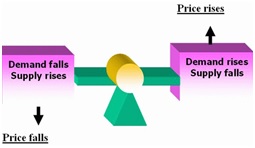|
 |
|
 |
Adam Smith - Philosophy and Business
Adam Smith (1723-90)
Scottish philosopher (pictured right), who was:
His most famous books
are... The Wealth of Nations (1776), supporting:
The Theory of Moral Sentiments (1759) which says that people must be moral and good - see points 2 and 3.
What did he say about business?
1. Competition and self-help Two things make everybody better off:
a) self-improvement Improve yourself through hard work and making money.
b) competition between businesses Smith famously called this the “invisible hand” 2. Morality Goodness is achieved by being:
The main cause of immorality is favouring the rich at the expense of the poor. 3. Business ethics Smith strongly opposed dishonest and unethical businesses. But he said businesses can be ethical (i.e. do good), and still make big profits, if the people in them do what’s right (see point 2).
4. Markets and self-interest Individuals and businesses should make as much money as possible Free markets should rule in which prices are determined by:
A modern example is:
Therefore, “Consumption is the sole end and purpose of production”, Smith said, Businesses produce more of things that people want So what’s good for business (production and profit) is good for people (products to satisfy their wants). 5. Less government, low taxes and freedom To encourage people and businesses to make money, these should be kept to a minimum:
6. Trade unions are bad Why? They increase people’s wages higher than businesses can afford, so forcing them out of business. People should look after themselves and not rely on trade unions for help.
7. Division of labour (or specialization) People work better, if they specialize in a particular job and do it again and again. So Smith said the making of something should be split up into smaller jobs (he used the example of making pins). This division of labour led to:
8. Free trade Countries should trade freely with each other without any taxes (or tariffs) on imports from abroad. So countries can:
There’s no point, he said, banning all foreign wines, so that Scotland can make claret and burgundy!
Key quote on corporate social responsibility (from The Wealth of Nations) It is not from the benevolence of the butcher, the brewer or the baker that we expect our dinner, but from their regard to their own interest.
Key quote on production (from The Wealth of Nations) Consumption is the sole end and purpose of production
Key quote on society (from The Wealth of Nations) All for ourselves, and nothing for other people, seems, in every age of the world, to have been the vile maxim of the masters of mankind.
Key quotes on economics (from The Wealth of Nations) No society can surely be flourishing and happy of which the far greater part of the members are poor and miserable. What is prudence in the conduct of every private family can scarce be folly in that of a great kingdom.
Key quote on management (from The Wealth of Nations) Monopoly...is a great enemy to good management.
Key quote on pricing (from The Wealth of Nations) The real price of everything...is the toil and trouble of acquiring it.
Key quote on customers (from The Wealth of Nations) The real and effective discipline which is exercised over a workman is not that of his corporation, but that of his customers.
Key quote on globalization (from The Wealth of Nations) The proprietor of stock is properly a citizen of the world and is not necessarily attached to any particular country
Key quote on ethics (from The Theory of Moral Sentiments) Humanity, justice, generosity and public spirit are the qualities most useful to others.
Key quote on economics and business ethics No patriot or man of feeling could therefore oppose it [growth]. But the nature of this growth... is at once undirected and infinitely self-generating in the endless demand for all the useless things in the world. (quoted by Charles Handy, in Beyond Certainty, 1995)
|
|
|
||
|
|
|
||
|
||
| Copyright © wisdomtowin.com All Rights Reserved | ||
|











